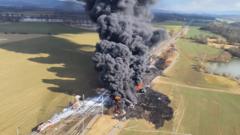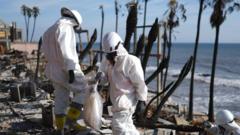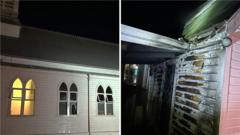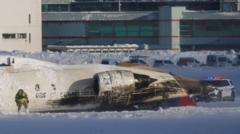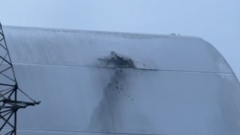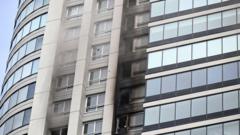Severe wildfires in Los Angeles have left residents on edge, exacerbated by a mistaken evacuation alert that sent shockwaves through the community.
**Mass Panic in LA Following False Evacuation Alert Amid Ongoing Wildfires**
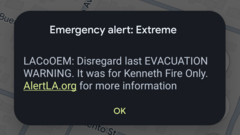
**Mass Panic in LA Following False Evacuation Alert Amid Ongoing Wildfires**
Residents react with anger after erroneous evacuation warning sent to millions as fires devastate the region.
The Los Angeles community remains fraught with tension as wildfires rage on, leaving a devastating impact on thousands of lives and properties. On Thursday, a misguided text alert warning of imminent evacuation was sent to over 10 million cell phones across the county, igniting panic among residents already wary after days of destruction. Rebecca Alvarez-Petit, who received the alarming notice during a work meeting, described the atmosphere of confusion and dread as many scrambled to verify their safety.
While an immediate follow-up message declared the alert a mistake, it only fueled frustration within the community. Alvarez-Petit expressed disbelief over the situation, emphasizing the lack of a solid communication system during a crisis. With the death toll climbing to at least ten and a growing sense of unease regarding emergency management, city officials, including Mayor Karen Bass, have been met with resentment over the handling of the situation.
During a press conference addressing the chaos, Mayor Bass attempted to quell rising anger but faced criticism concerning the city’s preparedness and resources. Residents have reported insufficient water supplies that hindered firefighting efforts, with Bass acknowledging past complaints about hydrant functionality. As flames encroached on neighborhoods, locals like Larry Villescas resorted to using hoses, only to find their water supply inadequate. Villescas lamented the sight of firefighters unable to act, a sentiment shared by many in a community enduring its most catastrophic fire season yet.
Experts have noted that the overwhelming demand for water from hundreds of firefighting units may have outpaced the capabilities of urban water systems. While residents grapple with the aftermath and the danger still looming, questions remain about infrastructure deficiencies and the potential for future disasters. Neighbors watching their homes turn to ash have voiced calls for urgent upgrades to public utilities, emphasizing that the risk is all too real and demands immediate action.
Alongside efforts to rectify communication blunders, authorities are committing to an evaluation of resource management and crisis response in hopes of restoring trust and enhancing readiness for future calamities. As the community rallies together during this hostile time, the experience serves as a stark reminder of the pressing need for preparedness in the face of nature's wrath.
While an immediate follow-up message declared the alert a mistake, it only fueled frustration within the community. Alvarez-Petit expressed disbelief over the situation, emphasizing the lack of a solid communication system during a crisis. With the death toll climbing to at least ten and a growing sense of unease regarding emergency management, city officials, including Mayor Karen Bass, have been met with resentment over the handling of the situation.
During a press conference addressing the chaos, Mayor Bass attempted to quell rising anger but faced criticism concerning the city’s preparedness and resources. Residents have reported insufficient water supplies that hindered firefighting efforts, with Bass acknowledging past complaints about hydrant functionality. As flames encroached on neighborhoods, locals like Larry Villescas resorted to using hoses, only to find their water supply inadequate. Villescas lamented the sight of firefighters unable to act, a sentiment shared by many in a community enduring its most catastrophic fire season yet.
Experts have noted that the overwhelming demand for water from hundreds of firefighting units may have outpaced the capabilities of urban water systems. While residents grapple with the aftermath and the danger still looming, questions remain about infrastructure deficiencies and the potential for future disasters. Neighbors watching their homes turn to ash have voiced calls for urgent upgrades to public utilities, emphasizing that the risk is all too real and demands immediate action.
Alongside efforts to rectify communication blunders, authorities are committing to an evaluation of resource management and crisis response in hopes of restoring trust and enhancing readiness for future calamities. As the community rallies together during this hostile time, the experience serves as a stark reminder of the pressing need for preparedness in the face of nature's wrath.

